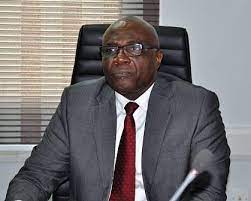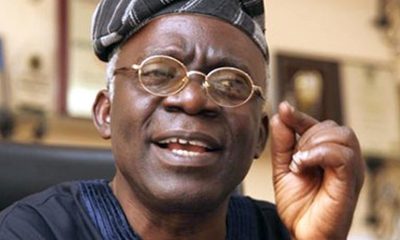A Lagos-based lawyer, Mr. Festus Keyamo, has opposed the idea of appointing the Chief Justice of Nigeria and Justice of the Supreme Court from the Bar.
Keyamo, in an open letter to President Muhammadu Buhari, Senate President Abubakar Bukola Saraki and the Chairman of the National Judicial Council, on Wednesday, June 8, 2016, argued that: “By virtue of Section 231 of the 1999 Constitution of the Federal Republic of Nigeria, these institutions are saddled with the responsibility for the appointments of the Chief Justice of Nigeria and Justices of the Supreme Court. In both cases, the National Judicial Council recommends, the President approves and the Senate confirms.”
He stated that “in the wake of the recent curious clamour for the appointment of these distinguished jurists to be made directly from the Bar, very senior members of the Bar and those who should know better have kept an ominous silence, which makes some of us very uncomfortable, hence, the need to speak up now.” Keyamo emphasized that the Justices of the Supreme Court who are directly affected or are likely to be affected by this proposal, cannot join issues publicly with these groups and individuals orchestrating this issue, and this creates an imbalance in the debate.
The legal practitioner acknowledged that “admittedly, there is no constitutional restriction as to where those to be appointed as Justices of the Supreme Court or Chief Justice of Nigeria could be picked, save for the criteria of a 15-year post-call as a barrister and solicitor in Nigeria.” He contended that, “however, traditionally, over the years, Justices of the Supreme Court have been elevated from the Court of Appeal and the most senior Justice of the Supreme Court has always been appointed the Chief Justice of Nigeria.”
Keyamo remarked that “this seamless, apolitical and non-controversial mode of succession at the Supreme Court over the years, especially, since the civilian era, has produced a Supreme Court that has engendered respectability and dignity. It has also emerged as a rancour-free institution.”
He said that there are only two instances in the past where the Chief Justice of Nigeria has been picked from outside the Supreme Court. These are the cases of Justices Adetokunbo Ademola and Teslim Elias. However, these two cases must be seen in the context that, at the material time, their appointers were not authorities that had any deep partisan political interests like we have today. One was during the colonial era and the other during the military era, he narrated.
Keyamo was of the view that in this era of deeply divided political interests, any attempt to introduce politics into the appointment of the Chief Justice of Nigeria would inevitably introduce deep divisions and rancour in the Supreme Court. It would also compromise the independence and integrity of the Supreme Court, he added.
He observed that one cannot be deluded that such an appointment would not be preceded by intense lobbying, recruitment of politicians into the scheme and some disgusting genuflection before the powers-that-be by the candidates jostling for the position. “And once appointed, such a CJN will have automatic reciprocal loyalty to his benefactors and appointer, thereby, opening up such a revered office as that of the CJN to political manipulation. We can then safely say goodbye to an independent Supreme Court and, by implication, our budding democracy,” he argued.
He was of the view that the suggestion that appointments made directly from the Bar will add vibrancy (whatever that means) to the Supreme Court cannot be more paramount than the need to ensure that Justices at that level are substantially detached from various interest groups in the society. As much as many members of the Bar have enormous integrity, it is a fact that by the nature of their job, they invariably get drawn into defending various interests and highly-placed individuals in the society.
He noted that over the years, lawyers develop deep ties with these various interests and individuals. When appointed to the Supreme Court as Justices or even the CJN, these interests cannot be shaken off overnight.
Keyamo in an open letter further highlighted thus, among others:
But in rising through the judicial hierarchy over the years to the Supreme Court, those Justices who were first appointed as Magistrates or High Court Judges begin to shed the weight of societal ties and interests gradually before they get to the Supreme Court.
One other advantage of rising through the judicial hierarchy to the Supreme Court is that the very many attributes of a judicial officer become evident and tested as the progression takes place. These are the attributes of productivity, hard work, patience, integrity and sagacity. There is no greater interview for an aspiring Justice of the Supreme Court than to look into his records at the lower judicial level and see the display of these attributes mentioned above. But there is hardly any trusted yardstick to test these attributes in a member of the Bar other than perception.
The Justices who rise through the judicial ladder are also known to live a spartan lifestyle, having been used to earning salaries and other allowances over the years. Successful lawyers, on the other hand, are used to earning fat fees from big briefs. How easy would it then be for a very successful lawyer appointed straight to the Supreme Court or as CJN to adjust to earning a relatively meager salary and adjusting to this spartan lifestyle?
It is also a fact that productivity is encouraged at the Court of Appeal and lower courts because the justices and judges at those levels aspire to move up the judicial ladder. They are encouraged to do this because the level of their productivity is normally used as criteria to elevate them. If this is now jettisoned, it would dampen their spirits and enthusiasm and would invariably lead to a drop in hard work and productivity at those levels. Everyone would then resort to politics, rather than hard work, to climb the judicial ladder.
Keyamo, thereafter, admonished: “Any attempt to pander to this clamour would create a warped system where a total stranger and outsider would come and exercise headship over the Justices of the Supreme Court. That would be totally unworkable. It will engender rebellion, dissent and lead to a divided house. We can then say goodbye to an independent Supreme Court. And we can then also say goodbye to democracy.”














 Entertainment5 days ago
Entertainment5 days ago
 Health1 week ago
Health1 week ago
 Health4 days ago
Health4 days ago
 Football1 week ago
Football1 week ago
 Football1 week ago
Football1 week ago
 Crime4 days ago
Crime4 days ago
 Education6 days ago
Education6 days ago
 Crime1 week ago
Crime1 week ago
